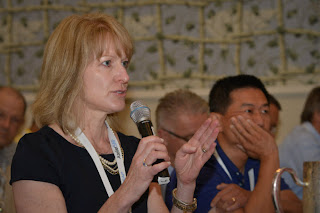If you work at SAP, you’re dedicated, meticulous and focused on the helping the company achieve its business objectives. At home, you’re committed to your family, your friends and ultimately, your life goals. All of us demonstrate the passion that makes us successful and hopefully brings us the happiness and sense of accomplishment we all deserve. The North America News team recently spent some time with one SAP employee whose journey brings her that sense of personal gratification and requires her to find the inner strength to accomplish her goal…quite literally. Mel Knourek, Executive Assistant to Jeff Harvey and John Tully, is just weeks away from competing in the 2013 World Masters Games (WMG) in Turin, Italy, hoping to break the world record for Olympic weightlifting for women.
“I’ve been a fighter since the day I was born,” said Mel. “I was born at 27 weeks and weighed less than 3 pounds.” Battling an eating disorder through adolescence and adulthood, Mel’s life has been a series of ups (graduating from the U.S. Marine Corps with a firefighting certificate) and downs (a bad marriage exasperating three auto-immune diseases). One of the ups, Mel remembers, was finding ice hockey. A natural skater, Mel found friends and a new confidence to live a happier life.
“I discovered a passion for being fit and healthy when I started playing ice hockey,” said Mel. Working with a friend to strengthen her tiny 88-lb frame, she soon joined CrossFit, a principal strength and conditioning program used at police academies and with tactical operations teams, military special operations units, and hundreds of other elite and professional athletes worldwide, and channeled her passion for fitness into an Olympic weightlifting program 2.5 years ago to simply improve her strength and technique. Four months into the program, Mel showed so much promise, she was informed she could compete in the 2013 World Masters Games [NA News Note: The World Masters Games promotes and encourages mature athletes from all over the world to compete at the Olympic level. Mel jokingly refers to the WMG as the “Old People Olympics.”]
 Mel credits SAP's Flex Appeal Program in giving her the flexibility in her schedule to work and train for this event. “If I need to work in the evening, I simply bring my laptop to work while I train,” she says. Her managers have supported this arrangement so Mel can excel both in the workplace and in her personal life, as well.
Mel credits SAP's Flex Appeal Program in giving her the flexibility in her schedule to work and train for this event. “If I need to work in the evening, I simply bring my laptop to work while I train,” she says. Her managers have supported this arrangement so Mel can excel both in the workplace and in her personal life, as well.
When not working or training for the upcoming competition, Mel still finds time to coach CrossFit classes and mentor other women. Her eating disorder? The auto-immune diseases? They’re in remission. Now weighing 125 pounds, Mel credits the 180 degree turn in her life to finding her passion. “It’s not about a medal…it’s about proving I am a somebody,” she explained.


























